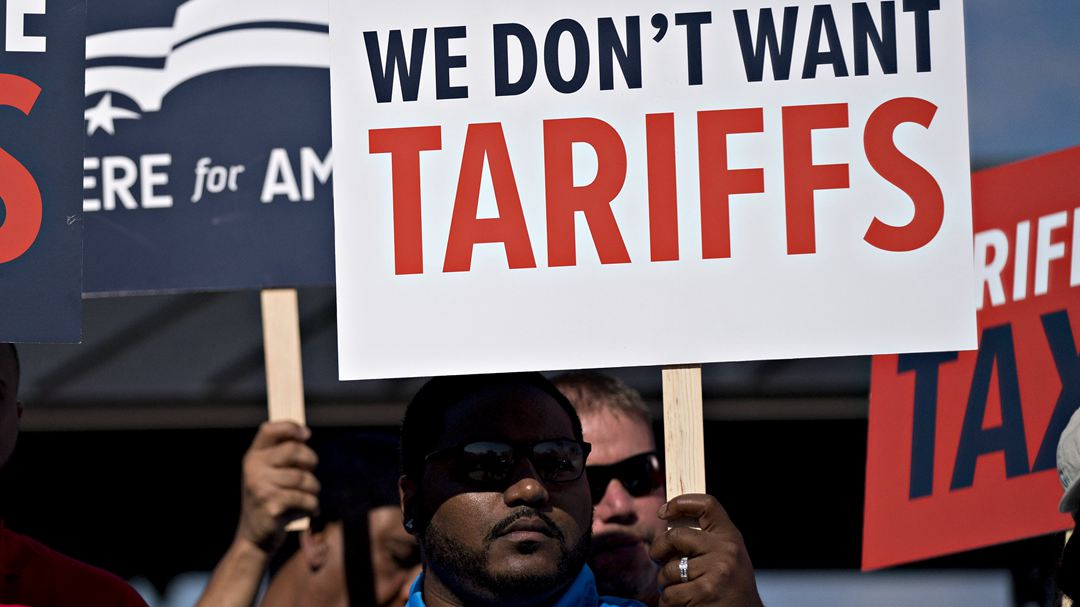
More business representatives have voiced opposition to the White House’s plan to impose tariffs on $200 billion worth of Chinese goods on Thursday at the ongoing hearing held by the Office of the US Trade Representative (USTR).
Apart from US representatives, the meeting was also participated by Chinese deputies from China-funded enterprises in the US, Chinese industry associations, and legal profession, who strongly opposed the tariff plan.
Expounding on the impact of the additional tariffs could place on both China and the US, the representatives called on the US government to remove their industries or products from the tariff list, so as to maintain healthy and stable China-US economic and trade relations.
“The tariff burden will be ultimately taken by US importers and consumers,” said Andrew Shoyer, the lawyer representing Fomdas Holding Group, a private company in eastern China, Zhejiang province, engaged in argo-food production whose canned oranges were targeted by the new tariff plan of the US.
“Specifically, those American consumers who do not have access to or cannot afford to buy fresh oranges will be severely impacted by the tariffs, such as schools and elderly care centers,” he pointed out during the hearing.
The lawyer said Chinese canned oranges were irreplaceable in the US market. In 2017, the US imported more than 160,000 tons of canned oranges from China, 95 percent of its total consumption.
“If the US government levies 25 percent tariffs on Chinese canned oranges, the importers will face a rising cost of $350 for each ton, or about $50 million in total,” he added.
A total of 1,170 Chinese agricultural products were on the proposed list that contained 6,031 tariff lines. Many products of the traditional industries were put on the list after being accused of “infringement of intellectual property rights”, which placed a number of businesses from both countries in helplessness.
“The US government’s proposed tariff plan on $200 billion worth of Chinese products is unilateral. It violates rules of the World Trade Organization (WTO) and sabotages global trading order,” said Yu Lu, deputy director of China Chamber of Commerce of Foodstuffs and Native Produce, who was present at the hearing.
She introduced that between 1998 and 2017, the total trade volume of farm produce between China and the US grew from $2.7 billion to $31.7 billion. In 2017, China’s trade deficit with the US on agricultural products exceeded $16.4 billion.
For the US, China was the largest export market for agricultural products , and bulk commodities including soybeans, she said, elaborating that 62 percent of the US soybean production went to China.
Stable China-US relations on agricultural trade will benefit farmers and consumers of both countries, Yu said, adding that the agricultural products on the proposed list subject to the additional tariffs account for 80 percent of China’s agricultural exports to the US.
She warned that it would greatly impact the US agricultural products market, drive up the cost of US consumers and hinder agribusinesses and employment.
“The tariff policy is forcing our company to reevaluate the risks of building a new factory in Louisiana,” said James Newport, general manager of Wanhua Chemical US Holding Inc.
Wanhua is an industrial leader of methylene diphenyl diisocyanate (MDI) production based in China with over 13,000 global employees. The company has established R&D center and sales office in the US.
Last year, Wanhua Chemical Group announced a plan to build a new factory in Louisiana with an investment of $1.2 billion, which is expected to create more than 1,200 jobs for local community.
But after the US government announced the tariff plan on steel and aluminum imports, and threatened to include aniline and other related chemical products in the $200 billion tariff list, the proposed Louisiana plant would cost an extra investment of tens of millions of dollars for Wanhua Chemical Group, putting its expansion plan in front of huge economic risk.
“Imposing additional tariffs on Chinese goods will impact various US industries, from large enterprises with tens of thousands of employees to small family businesses, which all have a high dependence on Chinese products, and to find substitutes in other countries in the short term would be difficult,” said Zhu Haicheng, a Chinese lawyer who spoke at the hearing on Wednesday.
He told People’s Daily that the process of the US to cancel tariff lines lacked transparency, and suggested that relevant Chinese companies should confer with US importers on countermeasures. It was necessary for them to be well prepared, both commercially and legally, he added.
“Compared with the previous additional tariffs on $34 billion and $16 billion of Chinese goods, the expanded range of $200 billion will cause even greater damage to the interests of the US and the international community”, said Tan Jian, head of the Legal Service Department of China Chamber of International Commerce.
This is the third time for Tan to attend the hearing for Section 301 investigation in Washington. He noted that the increase of tariffs would harm US companies who had been trying to optimize allocation of resources around the world, the US consumers who favor cost-effective Chinese products, and millions of low-income families in the US.
“China Council for the Promotion of International Trade will not agree with the US government on imposing additional tariffs on these products”, said Tan, adding that “China and the US should resolve their disputes through negotiations.”
